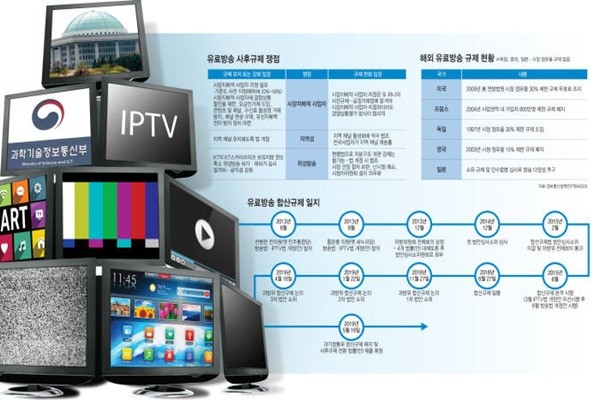There have been controversies surrounding South Korean Government’s plan to entirely change regulatory system of pay broadcasting industry. Despite South Korean Government’s goal to change regulations from ex ante regulations to ex post regulations to strengthen competitive edge of pay broadcasting industry, South Korean Government is introducing ‘mass regulation’.
Pay broadcasting industry is criticizing South Korean Government for determining subjects of regulations in advance and therefore bringing another ex ante regulation. Some brings up an opinion that there needs to be ‘change of thinking’ to strengthen regionality after considering the fact that status of national businesses is strengthened even more through M&A.
While there has not been any particular difference in opinions regarding strengthening public interest of satellite broadcasting, KT’s stocks holdings sale has been brought up as an issue. Ministry of Science and ICT (MSIT) needs to report its plan for ex post regulations of pay broadcasting industry according to abolition of unitary regulation to The National Assembly of the Republic of Korea’s Science, ICT, Broadcasting, and Communications Committee by the 16th.
◊Controversy surrounding appointment of market-dominating business
Designation of ‘market-dominating business’ is drawing controversies out of ex post regulations of pay broadcasting industry. South Korean Government wants to designate market-dominating businesses within pay broadcasting industry just like mobile network industry and enforce stronger regulations.
If this plan is materialized, there will be stronger regulations within pay broadcasting industry. There can be tight regulations such as rate approval system and regulations on channel organization. Plans for limiting discounts on bundle products are also mentioned.
These plans are based on insecurity about telecommunication businesses growing their sizes through M&A once unitary regulation is removed.
Plan for designating market-dominating business beforehand is drawing controversy as it contradicts South Korean Government’s plan to convert from ex ante regulation to ex post regulation.
“If regulations are set up based on particular market shares, those regulations are ex ante regulations and not ex post regulations.” said Professor Kim Sung-cheol of Korea University. “It is important for The National Assembly of the Republic of Korea’s Science, ICT, Broadcasting, and Communications Committee and Fair Trade Commission (FTC) to work together to monitor consumer damages.”
Designating market-dominating business by considering market situations in total is also mentioned. Most possible alternative is to introduce ‘competitive situation assessment system’ to pay broadcasting industry. Mobile network industry and super-fast internet industry enforce competitive situation assessment annually according to Telecommunications Business Act and they appoint market-dominating businesses and apply various regulations. One of the strengths of competitive situation assessment system is that corresponding industry can be flexible in reactions depending on situations.
There is no regulation on how market-dominating business is appointed within Broadcasting Act as each broadcasting business is limited to having 33% market shares at the maximum. As a result, some say that appointment of marketing-dominating business should be left to FTC.
“Because there is a regulation for monopolistic business within Fair Trade Act, it is undesirable to introduce market-dominating business regulation to Broadcasting Act and IPTV Act.” said Professor Park Min-soo of Sungkyunkwan University.

◊Plans for implementing regionality
Out of current pay broadcasting businesses, cable TV businesses are obligated to operate local channels. Based on this obligation, cable TV businesses insist that local business right needs to be tightened up while converting from ex ante regulations to ex post regulations. The National Assembly of the Republic of Korea also emphasized that there needs to be revision of relevant laws to strengthen local channels after seeing that ex post regulations means stronger power of IPTV businesses.
However, some are concerned that entrusting operation of local channels only to cable TV businesses actually regresses regionality. Average rating of local channels between 2013 and 2015 was only 0.19%, and more than half of pay broadcasting members who watch IPTV and satellite broadcasting channels could not watch local channels. There is a paradoxical ending where national businesses have to be involved to strengthen local channels.
Through a plan for developing pay broadcasting industry that was announced in December of 2016, MSIT allowed cable TV businesses to have at least two local channels in a short term and gave national TV businesses such as IPTV businesses obligations to operate local channels in a long term.
However, MSIT suggested solutions such as financial support after considering possible risks that can occur when major corporations directly use local channels. Cable TV businesses that have relatively low investment capabilities see national businesses supporting making of local channels as a positive. It is heard that telecommunication businesses mostly agree with South Korean Government’s plan to vitalize regionality within broadcasting industry.
While there is no difference in opinion regarding strengthening public interest of KT Skylife, ‘reduction of KT’s market shares’ has emerged as a hot issue. Although The National Assembly of the Republic of Korea is hoping to reduce influence of KT by reducing its market shares, which are currently at 49.99%, there is no legal basis to reduce KT’s market shares. It is also difficult to find a right candidate that will purchase stocks of KT Skylife, which has its profitability dropping, at a reasonable price.
According to Broadcasting Act, A business can be instructed to sell its stocks only if it obtains stocks without receiving an approval from MSIT or The National Assembly of the Republic of Korea’s Science, ICT, Broadcasting, and Communications Committee in advance. The National Assembly of the Republic of South Korea, South Korean Government, and KT do not have difference in opinions when it comes to other issues such as operation of broadcasting services in case of unification, resolution of fringe areas, and expansion of public channels
Staff Reporter Kim, Yongjoo | kyj@etnews.com